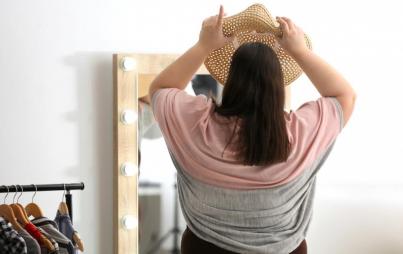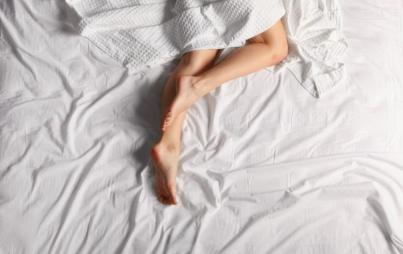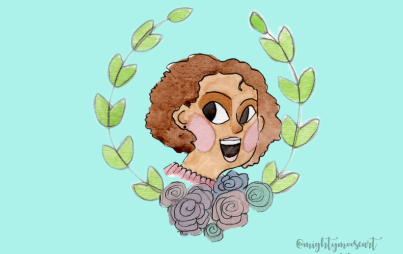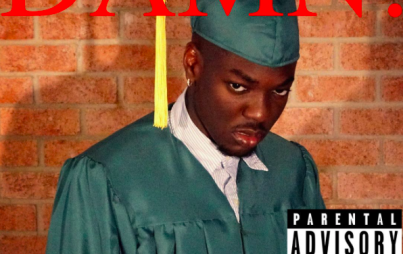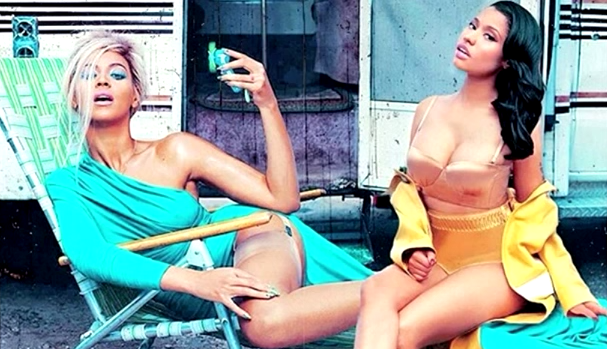
YouTube
"Feeling Myself" is just about what you'd think it would be from the title.
Nicki Minaj announces "I'm feelin' myself, jack rabbit/feelin' myself, back off/Cause I'm feelin' myself, jack off," referencing the Jack Rabbit vibrator. "Everytime I whip it I be talkin' so reckless."
Minaj is hardly the first performer to use masturbation as a tease—though the fact that Beyoncé guests on the track provides some insights into exactly what that tease is and how it works. The track moves from masturbation to hot sex—Nicki tells the guy to "gimme brain like NYU." But at the same time, the main interplay in the song is between Beyoncé's uber-sensual, Houston-esque, breathy-rapped hook and Minaj's fierce nasal spit.
The guy seems like an afterthought at best.
When Beyoncé declares, "male or female makes no difference, I stop the world," she could be talking about stopping her own world with her own female hand—but it could also be another kind of innuendo, directed at the other woman in the studio.
It's not the first time in the history of music that sexy female masturbation has pointed to, or flirted with, lesbianism. You can see this even more clearly in Tweet's classic 2002 jam "Oops (Oh My)." The song is supposedly an ode to masturbation:
"Tell you what I did last night
I came home, say, around a quarter to three
Still so high
Hypnotized
In a trance
From this body, so buttery brown and tantalizing
You woulda thought I needed help from this feeling that I felt
So shook I had to catch my breath."
"This body felt just like mine," the singer declares—which could mean that it is in fact her body, but could also mean it's somebody else's body, which is like hers in certain ways. Tweet sings "I looked over to the left," and the suggestion is that she's looking in a mirror. But in the video she ends up looking at Missy Elliott, who declares, "I was looking so good I couldn't reject myself." The song is a double entendre buried in a single entendre. Tweet sings about having sex with herself, but she's also singing about having sex with another woman—an interpretation emphasized by rumors of Missy's lesbianism, just as "Feeling Myself" picks up possibilities from rumors of Minaj's bisexuality.
If masturbation in song is often operating dually as a homosexual tease, that perhaps explains why, or how, songs about women masturbating are so different from those about men doing the same. "Feelin' Myself, "Oops (Oh My)" or the Divinyls semi-infamous "I Touch Myself" (the video of which includes women rubbing sensuously against each other) are all sexy. When you're a woman, touching yourself is hot. Guys touching themselves, on the other hand (as it were) is, at best, a joke.
In Chuck Berry's "My Ding-a-ling," the narrator keeps getting caught playing with his ding-a-ling—masturbation here is (amusingly) shameful, not sensual or appealing. The Buzzcocks' "Orgasm Addict" also presents masturbation as a dirty secret—infantilizing and compulsive.
"Well you tried it just for once found it all right for kicks.
But now you found out that it's a habit that sticks.
And you're an orgasm addict.
You're an orgasm addict.
Sneaking in the back door with dirty magazines.
Now your mother wants to know what all those stains on your jeans.
And you're an orgasm addict."
And then there's Billy Joel's "Captain Jack."
"Your sister's gone now—she's on a date/and you just sit at home and masturbate." Masturbation is the sad thing guys do when they can't get dates . . . as opposed to the Pussycat Dolls, who all sing to each other gleefully and lasciviously about how they don't need a man to get off.
Again, the illustrious Pussycat Dolls' "I Don't Need a Man" is about masturbation, but could also be about lesbianism. And if female masturbation and lesbianism are so conflated, it makes sense that male masturbation and male homosexuality are also linked. Which perhaps explains why it's so difficult for pop culture to represent male masturbation as sexy or, indeed, as empowering.
Lesbianism is often coded as sexy or exciting in numerous venues, for both male and female viewers. This is much less the case with male homosexuality. Instead, gay men are, still, often seen as ridiculous, or weak, or non-manly—which is exactly how male masturbators are generally portrayed in popular song.
For women, songs about masturbation generally seem meant to open up erotic possibilities, including lesbianism. Male songs about masturbation, though, seem designed to mock or close down pleasure—not least, homosexual pleasure.

